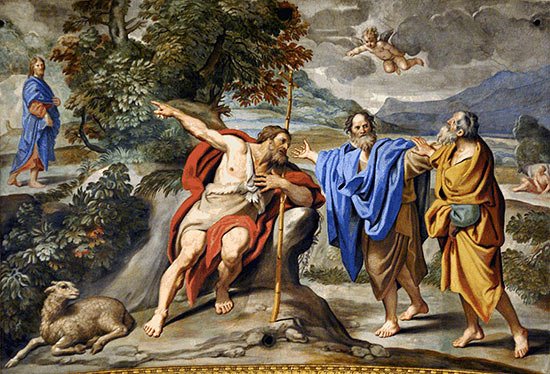
Today on this second Sunday of Advent – the longest Advent possible – and we meet John the Baptist. You’ll notice, we always meet John the Baptist this week. John is always the subject of the gospel in the second Sunday of Advent. John the Baptist is the voice crying out in the wilderness, “Prepare the way of the Lord. Make his paths straight.”
It’s hard to think of any person in history who could compare with St. John the Baptist. John was a complete outsider. He remained always on the margins of civilization. He did not go to the people: they had to come to him. John sought no political power. He never raised an army. It seems that he never tried to make himself pleasing to anyone and had no time for tact or diplomacy. Yet clearly, he had a massive impact on the whole society of his time. No one could ignore him, from the highest political and religious authorities, to the lowest of the common people. He must have had quite extraordinary charismatic appeal.
All four Gospels quote the text of Isaiah in reference to St. John the Baptist: “A voice of one that cries in the desert: Prepare a way for the Lord, make his paths straight.” (Is 40:3)
Isn’t it interesting that the gospel tells us that the Lord needs a way, a path, prepared in order to come to us? Isn’t it remarkable that the Lord, God, needs something from us, God’s creation, in order to come to us in the way in which God would like. This fits in with the nature of John the Baptist’s mission – a mission of preparation. It is a beginning, not an ending.
While we are preparing to make room in our homes for more stuff, John is asking us to prepare room for God, to make room for God.
But maybe after listening to John it’s tempting to look at the Advent wreath, with its two lit candles, and see the season of Advent as merely the countdown to Christmas. Let’s leave this wild man behind. We know Christmas came last year – in a much more limited fashion thanks to covid. It will come again this year just like it has for almost 2000 years. It’s only a few more weeks away. So maybe we can dismiss John’s message as just another folktale. Maybe it’s the rambling of a guy who’s spent too much time by himself in the desert eating grasshoppers. Or perhaps we hear the message and think about all those other people to whom it applies. You know, the Pharisees the Sadducees and the C&E Catholics; someone other than us.
But we can’t do that.
Every year in Advent, we remind ourselves, as John reminds us today, that Jesus is coming, and that means we need to repent, to change, to force ourselves into new ways of seeing the world and ourselves. Repentance isn’t just regret, it’s not just saying, “I’m sorry.” Repentance means turning down a new road, finding a new path, it means change.
John reminds us that our hope carries with it obligation. If Jesus is coming, if God has – in fact – never left us alone in the first place and will someday become real, touchable, flesh again; there are a few things we had better think about. “Repent!” John cries – ‘Change!’ But why? What does the arrival of God, the nearness of the kingdom of Heaven, have to do with us changing?
If what we do here in this life is about more than making ourselves feel good; If God is real and Jesus is coming, then everything that common sense tells us about our world and our priorities is wrong… dead wrong; because Jesus sets an entirely different standard.
Wealth? It’s worthless before a savior who said, “Blessed are the poor.”
Power? According to Jesus the real power lies among the meek.
Success? In the kingdom of heaven, the only accomplishment that matters is loving other people.
The readings today teach that total repentance is an achievable task, but it takes time. The repentance of Advent is a call for transformation.
What do you find when you examine your life? What truth does St. John hold before us? What patterns of behavior destroy our lives and relationships? Do the examination. Repent, change, not because we are bad, defective, or deficient but because we are worth it; because we have been created in the image and likeness of God, because God loves us, and God is coming. Today the second purple candle is lit. This candle typically represents faith or love. Some traditions call this the “Bethlehem Candle,” symbolizing Christ’s manger. Focus on that candle and ponder: What parts of my life require more practice?
When we repent, God gives us relief from the burden of sin, because He bore that burden on Calvary. When we repent God gives us the chance to live again. “Repent, for the kingdom of heaven has come near.”
The Christian life is a race. Unlike the earthly races, however, we don’t run to win but to finish the race and finish it well. How we finish is what matters, not the way we started. Not how we ran, because nobody is perfect, and we cannot completely rule out the risk of stumbling.
The lifestyle of John the Baptist and his Philosophy of Ministry make him an insignificant man with an outstanding Ministry. His life was very short. His Ministry didn’t last long. But one day God definitely told him: “Well done, good and faithful slave! You have been faithful with a few things. I will put you in charge of many things. Enter into the joy of your master.”
Will God be able to say the same about you and me? –
-Deacon Terry Murphy

